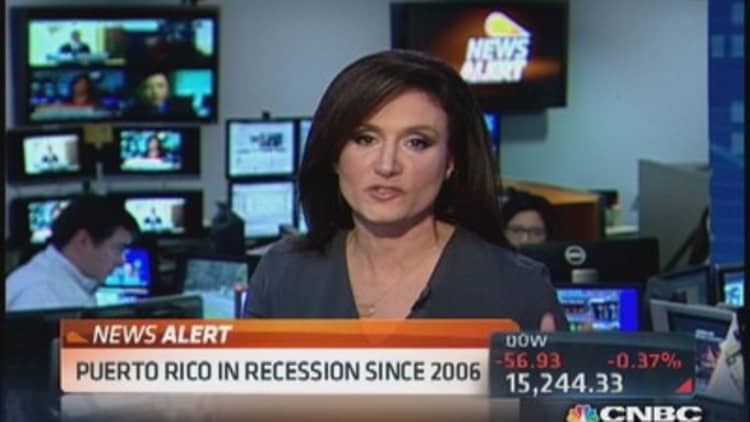
Representatives of the government of Puerto Rico talked to investors Tuesday afternoon, as the U.S. commonwealth tried to assuage market concerns about its ability to repay its massive debt load.
The governor of Puerto Rico told investors, "We will do everything to honor all our commitments."
The comment was the beginning of what was expected to be an up to three-hour presentation, with 75 PowerPoint slides, all designed to calm investor worries.
The island has more than $70 billion in debt, much of which has fallen in value as investor concerns have grown. As part of the presentation, the government announced its budget deficit for fiscal year 2014 is expected to be $820 million, down from a preliminary estimate of $1.29 billion in 2013, and $2.38 billion in 2012.
The government also said it plans to raise an additional $500 million to $1.2 billion during the remainder of this year, subject to market conditions, but that the Government Development Bank has "the financial flexibility" to adjust the financing plan. The Government Development Bank serves as a fiscal agent and financial advisor for the commonwealth.
Impact for American investors
The island's economy, meanwhile, has been closed to the capital markets as investors have demanded high interest payments before lending to Puerto Rico again.
The "so what?" here for Americans investors is that more than 75 percent of U.S. municipal bond funds own debt from Puerto Rico, according to Morningstar. The pervasiveness of the island's debt stems from its "triple exemption" status.
Interest payments received from Puerto Rico are not subject to federal, state or local taxes. That's why investors have been willing to lend the island roughly $70 billion, even though its economy is only about $100 billion.
Puerto Rico also is actively traded among high-yield investors, many of which are hedge funds, because there are so few places to find high yields. Some of Puerto Rico's debt is yielding nearly 9 percent tax-free.
The government recently has been trying to repair its budget by raising taxes and cutting pension costs. The U.S. commonwealth has been in a recession since 2006.
—By CNBC's Michelle Caruso-Cabrera. Follow her on Twitter: @MCaruso_Cabrera
This story has been updated to correct when the island fell into a recession.


